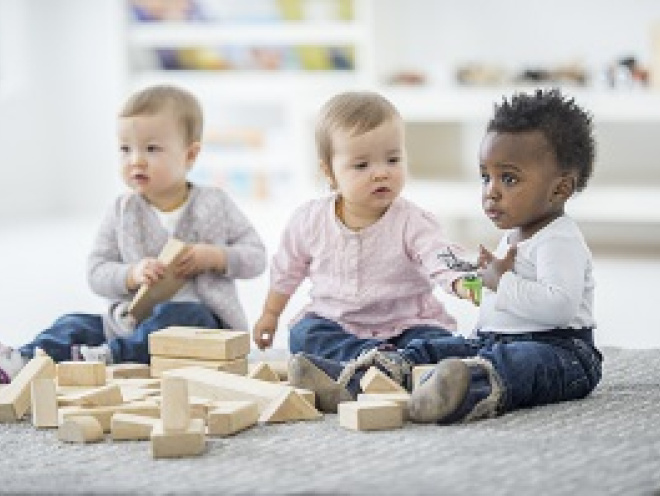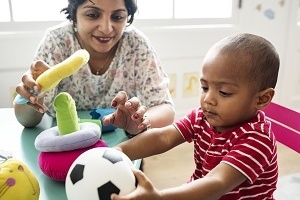Ever tried negotiating with your toddler? Not easy, right? Babies don’t always have the most refined tastes or opinions. But when do they realise others might not be on exactly the same page as them? And how can parents encourage empathy?
What is empathy, exactly?
Empathy is the ability to perceive and understand other people's emotions and to react appropriately (Leiberg and Anders, 2006). Expecting your toddler to pass you a beaker of milk and say ‘I know, I know...’ as you moan about the bills? Maybe not. But we know a lot of parents are fascinated by when their children can start to understand others’ experiences and feelings. And sometimes, that can just be a teddy with a sore tummy.
Why is empathy important?
We live in a social world so it’s important to show empathy towards others. That’s because empathy can be a motivator towards us being more thoughtful, helpful and cooperative. Empathy also makes us responsive.
There’s a link between children being empathetic in their early lives and a tendency to being more giving and considerate as they get older (Liddle et al, 2015). In studies with children whose mothers are depressed, the children showed slower signs of responding to stimulus like music, voices and facial expressions (Field et al, 2007).
When does empathy start?
There’s empathy and then there’s empathy. Newborns cry in response to another newborn’s cry, which researchers agree are early signs of empathy development (Geangu, 2010).
Studies also show that when a newborn hears a baby crying, their sucking motion and heart rate slow, as a response to the sound (Field et al, 2007). This physical reaction might not be what we normally describe as empathy but when babies don’t react in this way, it might predict a lack of empathy as the child grows (Field et al, 2007).
It’s generally thought that empathy proper begins to show itself in the second year of life (Liddle et al, 2015). But it could be there a lot earlier.
Research with eight-month-old babies showed that when one of them was in distress, the others took action so their mate got help more quickly. OK, so they weren’t ringing 999. But by looking at the distressed infant and the other mothers, rather than their own, they were able to convey the message that ‘Oi, one of us needs help’.
How does empathy work?
To be able to empathise with someone, you have to identify yourself as a different and unique thing. Bear with us. We generally begin to become self-aware at about two years old (Courage et al, 2004). And it’s in this second year of life that we see the start of showing concern for others (Knafo et al, 2008).
Our ability to empathise is a mixture of our genetic disposition and our environment. And our environment plays an increasingly important role the older we get (Knafo et al, 2008).
How can we encourage empathy?
We’ve all been there. A child is playing nicely with a toy and another child barges up to them and pushes them over to get to it. It’s distressing enough if you’re the child, let alone the parent of the marauder.
Empathy helps us understand the world through someone else’s experiences. It allows us to understand what others need and provide support to make them feel better. Sounds like a lot for a young child to do? You’d be surprised. One study showed that from around 14 months, babies begin to show the different factors of what makes up empathy:
- Empathic concern – wanting to help another person in distress.
- Hypothesis testing – trying to understand what happened to cause the distress.
- Prosocial behaviour – trying to make things better through giving a hug, for example.
(Knafo et al, 2008)
What can we do to help our children develop this vital skill for life? The following science-based tips could help the empathy flourish:
Giving them a strong supportive relationship
If your child feels secure and able to express their own emotions, both good and bad, that makes it easier to help others.
Making empathy part of the conversation
The more time you take to discuss how you, your child or even that teddy with a sore tummy might be feeling, the more it becomes part of their everyday life to consider others.
Getting to know different people
From a very young age, we find it easier to empathise with someone we see as similar (Zahn-Waxler et al, 1984). And prejudices can start when we have little or no contact with people who are different from us. One of the best ways to find things in common is to spend time with other people.
Teaching your little one how to read facial expressions
Being able to read nonverbal cues can help them understand how someone is feeling. Children don’t automatically know the difference between a happy face, a sad face or an angry face and can easily misinterpret someone’s facial expression. So by playing games or using toys with different faces, you can help them get a head start.
Mimicking expressions – it can help experience emotions
Research has shown that when we play-act at facial expressions, we actually experience some of the emotion we’re trying to show. So we can help develop empathy by role-playing and it really can help us feel what someone else is going through (Dewar, 2018).
Children are capable of feeling empathy a lot earlier than you might have thought. As parents and carers, we can help develop this important life skill via daily fun and games. So give some games a go.
This page was last reviewed in April 2019.
Further information
Our support line offers practical and emotional support with feeding your baby and general enquiries for parents, members and volunteers: 0300 330 0700.
You might find attending one of our NCT New Baby groups helpful as they give you the opportunity to explore different approaches to important parenting issues with a qualified group leader and other new parents in your area.
Make friends with other parents-to-be and new parents in your local area for support and friendship by seeing what NCT activities are happening nearby.
Bedford R, Pickles A, Sharp H, Wright N, Hill J. (2015) Reduced face preference in infancy: a developmental precursor to callous-unemotional traits? Biological Psychiatry. 78(2):144-150. Available from: https://www.ncbi.nlm.nih.gov/pubmed/25526972 [Accessed 12th March 2019]
Courage M, Edison S, Howe ML. (2004) Variability in the early development of visual self-recognition. Infant Behavior and Development. 27. 509-532. Available from: https://www.sciencedirect.com/science/article/pii/S0163638304000463 [Accessed 12th March 2019]
Dewar G. (2018) Parenting science. Available from: https://www.parentingscience.com/teaching-empathy-tips.html [Accessed 12th March 2019]
Field T, Diego M, Hernandez-Reif M, Fernandez M. (2007) Depressed mothers' newborns show less discrimination of other newborns' cry sounds. Infant Behavior and Development. 30(3):431-435. Available from: https://www.ncbi.nlm.nih.gov/pubmed/17412424 [Accessed 12th March 2019]
Geangu E, Benga O, Stahl D, Striano T.(2010) Contagious crying beyond the first days of life. Infant Behavior and Development. 33(3):279-288. Available from: https://www.ncbi.nlm.nih.gov/pubmed/20362341 [Accessed 12th March 2019]
Knafo A, Zahn-Waxler C, Van Hulle C, Robinson JL, Rhee SH. (2008) The developmental origins of a disposition toward empathy: Genetic and environmental contributions. Emotion. Available from: https://www.ncbi.nlm.nih.gov/pubmed/19102585 [Accessed 12th March 2019]
Leiberg S, Anders S. (2006) The multiple facets of empathy: a survey of theory and evidence. Prog Brain Res. 156:419-40. Available from: https://www.ncbi.nlm.nih.gov/pubmed/17015094 [Accessed 12th March 2019]
Liddle MJ, Bradley BS, Mcgrath A. (2015) Baby empathy: infant distress and peer prosocial responses. Infant Mental Health Journal. 36(4):446-458. Available from: https://www.ncbi.nlm.nih.gov/pubmed/26112352 [Accessed 12th March 2019]
Zahn-Waxler C, Hollenbeck B, Radke-Yarrow M. (1984) The origins of empathy and altruism. Advances in animal welfare science. The Humane Society of the United States, Washington: 21-41.








